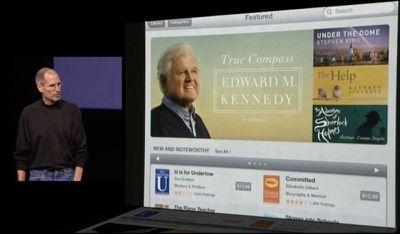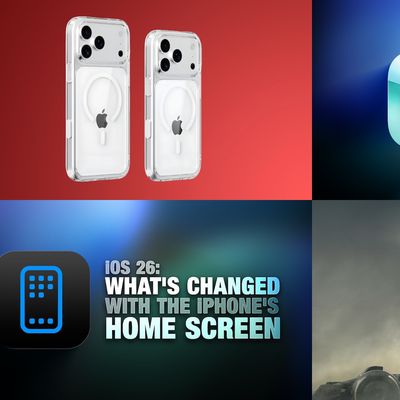Steve Jobs Didn't Want an iBookstore, but the iPad and Eddy Cue Changed His Mind
Testifying in court yesterday as part of the ongoing e-books price fixing trial, Apple senior vice president for Internet Software and Services Eddy Cue offered some perspective on the history of iBooks and the iBookstore, noting that Steve Jobs was initially opposed to such a project. As shared by AllThingsD, Cue noted that it wasn't until just prior to the launch of the iPad that he was able to convince Jobs of the potential of e-books.
“… When I got my first chance to touch the iPad, I became completely convinced that this was a huge opportunity for us to build the best e-reader that the market had ever seen,” Cue said. “And so I went to Steve and told him why I thought [the iPad] was going to be a great device for ebooks. … and after some discussions he came back and said, you know, I think you’re right. I think this is great, and then he started coming up with ideas himself about what he wanted to do with it and how it would be even better as a reader and store.”
Cue had initially suggested an e-book effort earlier in the fall of 2009, but Jobs felt that the iPhone's screen was too small to allow for a good user experience and that the Mac didn't feel like a reading device. By the time Jobs was on board, it was November, and the iPad was scheduled for a January introduction, giving Cue just weeks to line up the deals needed to build the iBookstore.

In relating the story, Cue noted that getting the iBookstore deals done took on special significance for him, as it was obvious that Jobs was in declining health at the time. Jobs had taken a strong interest in iBooks for iPad, and was committed to showing it off at the iPad media event, giving Cue extra incentive to make sure everything was in place.
Popular Stories
A new Apple TV is expected to be released later this year, and a handful of new features and changes have been rumored for the device.
Below, we recap what to expect from the next Apple TV, according to rumors.
Rumors
Faster Wi-Fi Support
The next Apple TV will be equipped with Apple's own combined Wi-Fi and Bluetooth chip, according to Bloomberg's Mark Gurman. He said the chip supports ...
Apple will launch its new iPhone 17 series in two months, and the iPhone 17 Pro models are expected to get a new design for the rear casing and the camera area. But more significant changes to the lineup are not expected until next year, when the iPhone 18 models arrive.
If you're thinking of trading in your iPhone for this year's latest, consider the following features rumored to be coming...
Apple's next-generation iPhone 17 Pro and iPhone 17 Pro Max are only two months away, and there are plenty of rumors about the devices.
Below, we recap key changes rumored for the iPhone 17 Pro models.
Latest Rumors
These rumors surfaced in June and July:A redesigned Dynamic Island: It has been rumored that all iPhone 17 models will have a redesigned Dynamic Island interface — it might ...
The long wait for an Apple Watch Ultra 3 is nearly over, and a handful of new features and changes have been rumored for the device.
Below, we recap what to expect from the Apple Watch Ultra 3:Satellite connectivity for sending and receiving text messages when Wi-Fi and cellular coverage is unavailable
5G support, up from LTE on the Apple Watch Ultra 2
Likely a wide-angle OLED display that ...
iPhone 17 Pro and iPhone 17 Pro Max models with displays made by BOE will be sold exclusively in China, according to a new report.
Last week, it emerged that Chinese display manufacturer BOE was aggressively ramping up its OLED production capacity for future iPhone models as part of a plan to recapture a major role in Apple's supply chain.
Now, tech news aggregator Jukan Choi reports...
The iOS 26 public beta release is quickly approaching, while developers have recently gotten their hands on a third round of betas that has seen Apple continue to tweak features, design, and functionality.
We're also continuing to hear rumors about the iPhone 17 lineup that is now just about right around the corner, while Apple's latest big-budget film appears to be taking off, so read on...
Apple will launch a new 12th generation entry-level iPad in the spring of next year, according to Bloomberg's Mark Gurman.
Apple is said to have two versions of the entry-level 11-inch iPad in development, codenamed J581 and J582. These could refer to different storage capacities – in which case, Apple may be planning to drop the existing lowest capacity option. The current iPad 11 is...




















